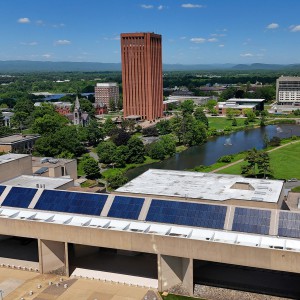Climate activist Bill McKibben’s light in dark times: Solar

Dr. Bill McKibben speaks to a packed audience at UMass Old Chapel about the realities of the climate crisis. STAFF PHOTO/EMILEE KLEIN
| Published: 12-03-2024 5:14 PM |
AMHERST — The past few weeks have been tough for climate activism, and longtime climate activist Bill McKibben, who makes his home in Vermont, is feeling the heat.
This year will be the hottest year on record, breaking the record-setting temperatures from 2023. President-elect Donald Trump has repeatedly denied facts or relayed false information about climate change, most recently incorrectly claiming that sea level rise will increase seaside property values. Even at the international level, global climate conferences produced very little progress on limiting C02 and other climate-changing gases, McKibben notes, as represented by Azerbaijan’s president proclaiming that gas and oil are a “gift from God” at COP29.
“The fossil fuel industry has achieved, in its own mind, all of its aims,” said McKibben, founder of international grassroots climate movement 350.org. “They mobilized every bit of money that they could, and they’re firmly convinced that they are in control of the situation in a way that they haven’t been for a while.”
Yet it’s during these difficult times that McKibben refocuses on his “north star”: the sun. Renewable energy is now cheaper to produce than coal and gas, McKibben said, largely due to China’s incredibly cheap and efficient solar panel production.
“We’ve done extraordinary work over the years to try and stop the fossil fuel industry as much as we could, to stand up to pipelines, to demand divestment on and on. Those things will be hard for the next four years,” he says. “But now we have economic gravity working in the right direction, and we just have to speed it along.”
For UMass’ third annual Ellsberg Lecture, “Back to the Wall, Face to the Sun” on Monday night, McKibben told a packed audience at the Old Chapel how the world has begun to embrace the most effective tool for displacing fossil fuels and mitigating climate change. He plans to continue the climate fight by championing the growth of renewable energy infrastructure, even under the current dire circumstances.
“I do think that it is a spectacular notion to imagine powering this world on energy from heaven, not from hell,” McKibben said.
McKibben has spoken out against fossil fuels since the late 1980s. Influential author and journalist, he wrote “End of Nature,” a book credited with first introducing the concept of climate change to a general audience. He founded the first international grassroots climate movement 350.org in 2007. Recently, McKibben was campaigning in swing states with the Third Act, a climate movement aimed at seniors.
Article continues after...
Yesterday's Most Read Articles
The work of activists like himself, McKibben said, coupled with innovation by engineers, laid the groundwork for the surge in renewable energy happening all over the world. Pakistan, a country hit hard by hot, smoggy cities and extreme flooding linked to climate change, took advantage of its proximity to China and built 50% of the national electric grid with solar panels in just a year. As a result, the country will use 30% less diesel fuel in 2024 than in 2023, he said.
“I was surprised that renewable energy was actually less expensive,” said lecture attendee Amy Vognvasin, a Northfield Mount Hermon student. “People here are probably still stuck on the notion that one of the barriers towards it (renewable energy) is the price, but it’s not.”
The cost of solar panels, however, is not just money. McKibben said land and mining for toxic raw materials are both required to create the renewable energy infrastructure vital to society, but those costs are nowhere near the footprint of land and resources used to produce coal, gas and oil.
Solar panels require rare-earth metals including lithium and cobalt mined from deep in the ground, which McKibben said can leave “a wound on the surface of the planet.” But unlike oil drilling or coal mining, materials in solar panels and batteries can be recycled effectively after their lifespans, which he says can be extended to 40 years or so.
“Rocky Mountain Institute put out a paper that said essentially we should be able to do almost all the mining that we’re going to need to do for the ‘green tech revolution’ by about 2050, after which point it should just be constant recirculation that we’ve taken out of the ground,” he says.
Similarly, drilling in oil fields, working coal mines and even using cornfields for ethanol production take up huge swaths of land in the Midwest, South and western United States. Greener energy not only uses significantly less land, McKibben said, but the land can be dual-purpose. Solar fields in Vermont have experimented with growing native plants for pollinators, he noted, and solar panels are much more efficient energy producers than plants.
“If this (acre of land) was growing corn to be used for ethanol, that acre would produce about enough ethanol to drive A Ford F-150 about 25,000 miles,” McKibben said. “If you cover it in solar panels, it produces enough electricity to drive the Ford F-150 Lightning, not 25,000 miles, but 550,000 miles.”
During the question and answer portion of his talk Monday, McKibben addressed several questions about the intersection between geopolitics and climate change. He called renewable energy a natural rebalancing of global power because every human on Earth has access to the sun, as opposed to the few countries in the Global North with concentrated amounts of fossil fuels that must be distributed around the world.
“I really like the way he was talking about how the sun goes around the Earth every day, and how that’s free transportation of the electricity that we need,” Northfield Mount Hermon student Maeve Tholen said. “It was really beautiful and made me feel a lot more hopeful about some of these things that are hard for people to wrap their heads around because they’re so scientific and political.”
McKibben asked the audience what the Pioneer Valley could do if it treated local electrons like local crops. The hundreds of millions of dollars the area spends on gas, oil and coal would instead be invested back into society, therefore fostering community like never before, he said.
“This is a great revolution, and one of its blessings is that it’s inherently a little more small ‘d’ democratic than the thing that it replaces,” McKibben said. “It moves us in the direction of community, because the sun and the wind are everywhere.”
Emilee Klein can be reached at eklein@gazettenet.com.






 ‘Delightful’ Northampton store shopping guide Jane Hertz, 88, seeking next gig
‘Delightful’ Northampton store shopping guide Jane Hertz, 88, seeking next gig Five UMass Amherst students have visas, student status revoked
Five UMass Amherst students have visas, student status revoked Photo: Spring calling
Photo: Spring calling A father’s dream to be the best: Twelve men graduate from Nurturing Fathers program
A father’s dream to be the best: Twelve men graduate from Nurturing Fathers program
